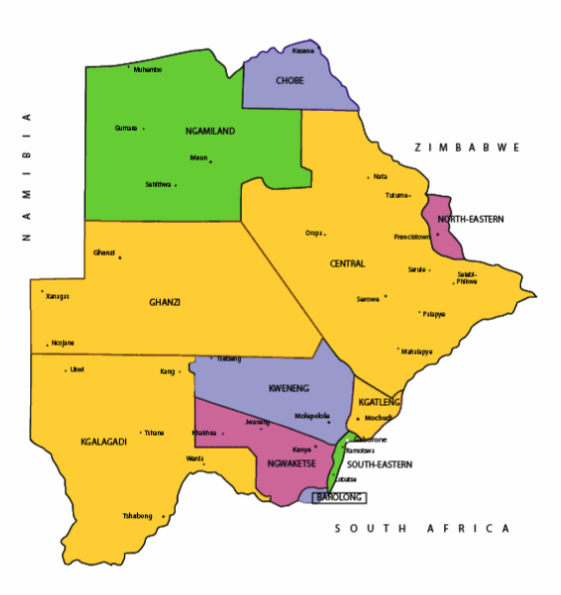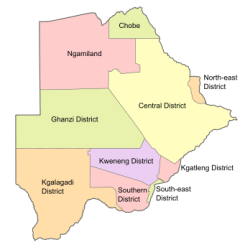Places and their polling stations in Mochudi West, Botswana
250 Rasesa
1221 Rasesa Primary School
1222 Borite (Tent)
1223 Khudiring Football Ground (Tent)
1224 Khudiring Open Space
251 Dikgonnye-Kgomodiatshaba
1225 Kgomodiatshaba Primary School
1226 Dikgonnye Primary School
1227 Khurutshe Primary School
1228 Bodungwane Clinic (Tent)
252 Mosomane
1229 Artesia Primary School
1230 Tlhomadithotse Kgotla (Tent)
1231 Leshibitse Primary School
1232 Artesia Kgotla
253 Pilane
1233 Pilane Primary School
1234 Open Space Next To Nono Matlhaga’s Residence
254 Morwa
1235 Ramogotsi Primary School
1236 Morwa Community Hall
1237 Morwa Clinic (Tent)
255 Bophirima
1238 Agriculture Office (Tent)
1239 Mochudi Sub-Land Board Office
1240 Matsieng Primary School
1241 Phaphane Primary School
1242 Mochudi Fire Station
256 Moshawana
1243 Seingwaeng Primary School
1244 Bollatshwene (Tent)
1245 Isang Primary School
1246 St. John Church (Tent)
1247 Rampedi Kgotla
257 Bokone
1248 Old Linchwe Primary School
1249 Mmadipamo Primary School
1250 St. Paul Church
1251 Mmadipinosi Shop (Tent)
258 Mosanta
1252 Mmusi Primary School
1253 Marula-A Ratsheole (Tent)
1254 Segale Primary School
1255 Makakatlela Open Space
259 Ntshinoge
1256 Malotwana Community Hall
1257 Ntshinoge Primary School
1258 Ithuteng JSS
1259 Spiritual Healing Church
260 Mabodisa
1260 Mabodisa Kgotla (Tent)
1261 Kgamanyane JSS
1262 Mochudi Main Kgotla (Tent)
1263 Rantsipe Kgotla (Tent)
261 Makgophana
1264 Bogatsu Primary School
1265 Makgophana Clinc
1266 Alliance Church
Reference: iec.gov.bw/index.php/electoral-districts/polling-stations.html
Botswana
Botswana is a country in Africa. It is topographically flat, with approximately 70 percent of its territory being the Kalahari Desert.
It is bordered by South Africa to the south and southeast, Namibia to the west and north, and Zimbabwe to the northeast.
Capital: Gaborone
Currency: Botswanan Pula
Official language: English
Population: 2.588 million (2021) World Bank
Dialing code: +267
Gross Domestic Product: 17.61 billion USD (2021) World Bank
Botswana’s ten districts are:
- Southern District
- South-East District
- Kweneng District
- Kgatleng District
- Central District
- North-East District
- Ngamiland District
- Kgalagadi District
- Chobe District
- Ghanzi District
Botswana’s councils created from urban or town councils are: Gaborone City, Francistown, Lobatse Town, Selebi-Phikwe Town, Jwaneng Town, Orapa Town and Sowa Township.






The name Botswana refers to ‘Land of the Tswana’. The landlocked, Southern Africa country is officially known as the Republic of Botswana.














Botswana is connected to Zambia through the Kazungula Bridge making it the world’s shortest border between two countries.
A country of slightly over 2 million people (2021), Botswana is one of the most sparsely populated countries in the world. It is essentially the nation state of the Tswana ethnic group, who make up 79% of the population.

About 11.6 per cent of the population lives in the capital and largest city, Gaborone.
Formerly one of the world’s poorest countries—with a GDP per capita of about US$70 per year in the late 1960s—it has since transformed itself into an upper-middle-income country, with one of the world’s fastest-growing economies.


The Tswana ethnic group were descended mainly from Bantu-speaking tribes who migrated southward of Africa to modern Botswana, living in tribal enclaves as farmers and herders.




In 1885, the British colonised the area and declared a protectorate under the name of Bechuanaland.
As colonisation stopped, Bechuanaland became an independent republic under its current name on 30 September 1966.


Since then, it has been a representative republic, with a consistent record of uninterrupted democratic elections and the lowest perceived corruption ranking in Africa since at least 1998.

The economy is dominated by mining and tourism. Botswana has a GDP (purchasing power parity) per capita of about $18,113 as of 2021, one of the highest in subsaharan Africa.


Botswana is the world’s biggest diamond producing country.
Its relatively high gross national income per capita gives the country a high standard of living and the third-highest Human Development Index of continental Sub-Saharan Africa (after Gabon and South Africa).
The country has been adversely affected by the HIV/AIDS epidemic. In 2002, Botswana began offering anti-retroviral drugs (ARVs) to help combat the epidemic.
Botswana is a member of the Southern African Customs Union, the Southern African Development Community, the Commonwealth of Nations, and the United Nations.
